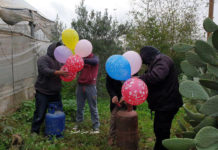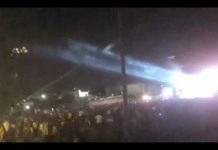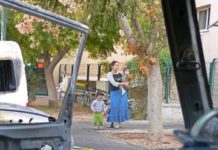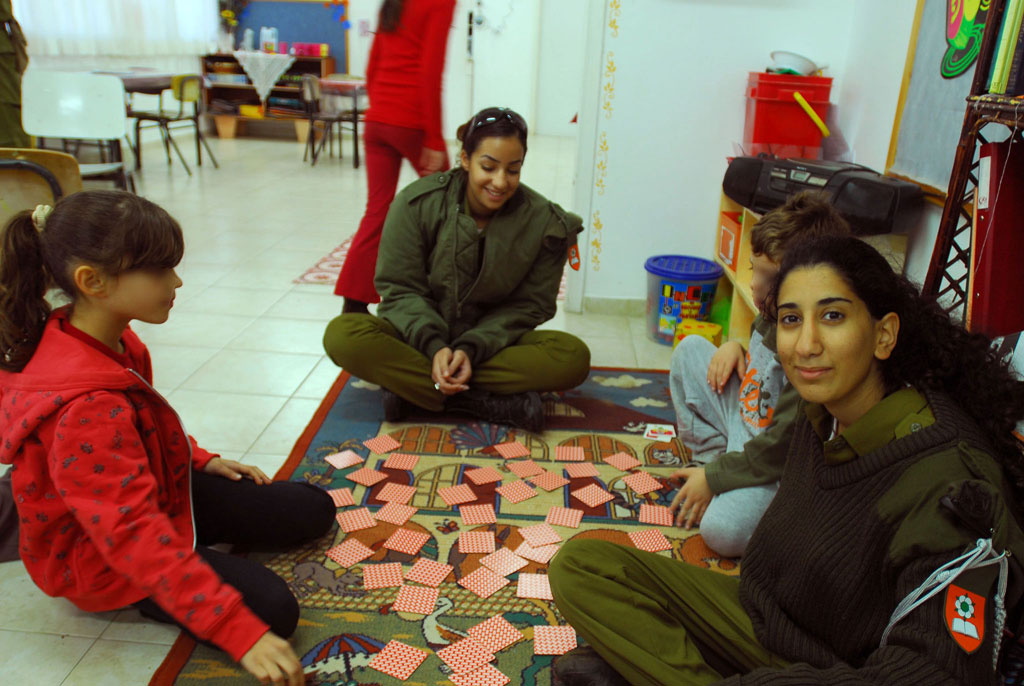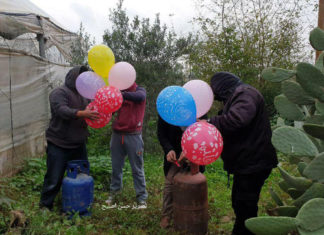At least half of Israel is in range of missiles fired from the Gaza Strip this summer. For mental-health workers, this means dealing with massive emotional fallout from the unpredictable and unrelenting “Code Red” sirens and booms of falling projectiles – even when they do not cause physical damage.
Roni Lior, the Israel Trauma Coalition’s project coordinator for Sderot and the Gaza region, points out that Gaza border communities have suffered 14 years of constant exposure to Kassams and other deadly rockets.
“In these communities, every child under the age of 14 has spent all of his life like this,” she says. “The effects vary, from avoidance of specific activities — like refusing to walk to school along a route where a rocket once fell – to intrusive thoughts where you feel like you’re re-experiencing the traumatic event; and hyper-vigilance, where everything makes you jump.”
Israeli soldiers play with children in a bomb shelter to keep them calm. Photo: IDF Spokesperson
She notes that before a Code Red alarm there is a sound like a microphone being turned on. “If you walk around big malls, you’ll see people getting agitated by the PA system because it sounds exactly like the beginning of a Code Red.”
Usually, trauma is treated in a safe place when the ordeal is over. That is not the case in Sderot and surrounding towns.
“Here, you cannot tell the person ‘You’re safe and the trauma is not going to reoccur.’ On the contrary, you know it will happen again,” says Lior. “The person is not really safe, and we have to address this by giving them very useful, practical tools to cope with the current situation on their own.”
She emphasizes, however, that Sderot and other Gaza border towns are extraordinarily resilient. “This is a very strong community and they support each other. The first thing that happens when the siren sounds is you open your front door in case somebody walking by needs a safe room. Only then do you go to a shelter.”
‘A clear sense of what to do’
The situation is somewhat different for communities outside a seven-kilometer range of Gaza, which got their first taste of Hamas missiles in November 2012.
“We saw back then that local governments had difficulty gaining control of the situation and understanding how to respond. Since then, we have helped many of them create emergency protocols and we’ve provided a vast variety of training. It’s amazing to see the differences between how they are handling situations now as opposed to a year and eight months ago,” says Lior. “This has a huge positive impact on the population. They see their leadership has a clear sense of what to do.”
In the summer of 2014, a third layer of Israeli communities is involved. Rockets are hitting areas that were previously out of range, including central Israel, greater Jerusalem, the Western Galilee and deeper into the Negev.
Lior says the ITC is getting requests from such places to provide the services offered in 2012 to the second tier of communities. For example, they want to train operators at municipal call centers to discern when a caller may need professional help for anxiety or trauma – even if that is not the main reason for the call.
The organization has resilience centers in the south where people can come for help with anxiety, and recently opened additional stress treatment sites. Hundreds have been treated one-on-one and in group settings since the beginning of the current conflict. Just in Sderot, on a single Thursday there were 12 emotional support groups running for parents, children, teachers and the elderly.
Summer camps are closed in all towns within 40 kilometers of Gaza unless conducted in a protected environment.
“In the Gaza region, this is not an issue because everything has a bomb shelter within a short distance,” says Lior. “In second-tier towns like Netivot and Ofakim, the municipalities are placing informal education teams in local bomb shelters. ITC is supporting this with sessions in art and drama therapy. We hope we can get resources to provide therapeutic board and card games developed by our resilience-center professionals to help children talk about emotions and find inner strength.”
Calls to hotlines increase
Two ITC member organizations, Natal and Eran, are experiencing a significant increase in hotline calls. Eran reported 6,000 calls in one 24-hour period alone, many from young children. Phone counselors can often help just by coaching callers in relaxation techniques and breathing exercises.
According to the ITC, many parents from both Gaza border areas and the Tel Aviv-Gush Dan region have been calling hotlines to seek help with children crying, vomiting, shaking uncontrollably, wetting the bed or suffering stomach pains. In response, ITC developed an informational pamphlet for parents in English and Hebrew. The RADAR Center/Negev Project Vision at Ben-Gurion University of the Negev also published “psychological first aid” guides for parents.
Natal has a mobile unit operating in Ofakim, Sderot and Netivot providing individual and group therapy, while home psychological treatment for elderly Holocaust survivors is provided by Amcha. The Selah Crisis Management Center is in constant contact with its immigrant clientele, providing house visits and telephone consultations where needed.
Populations at particularly high risk have been moved to the North for direct trauma care and resilience training by ITC experts.
“The stress and anxiety are enormous, but alongside them we are witnessing a tremendous feeling of kindness and solidarity throughout the country,” wrote the ITC in a report to donors; “offers from families living in the North to host families from the South as well as independent youth initiatives in Jerusalem to entertain, host and support their counterparts from Southern communities.”



